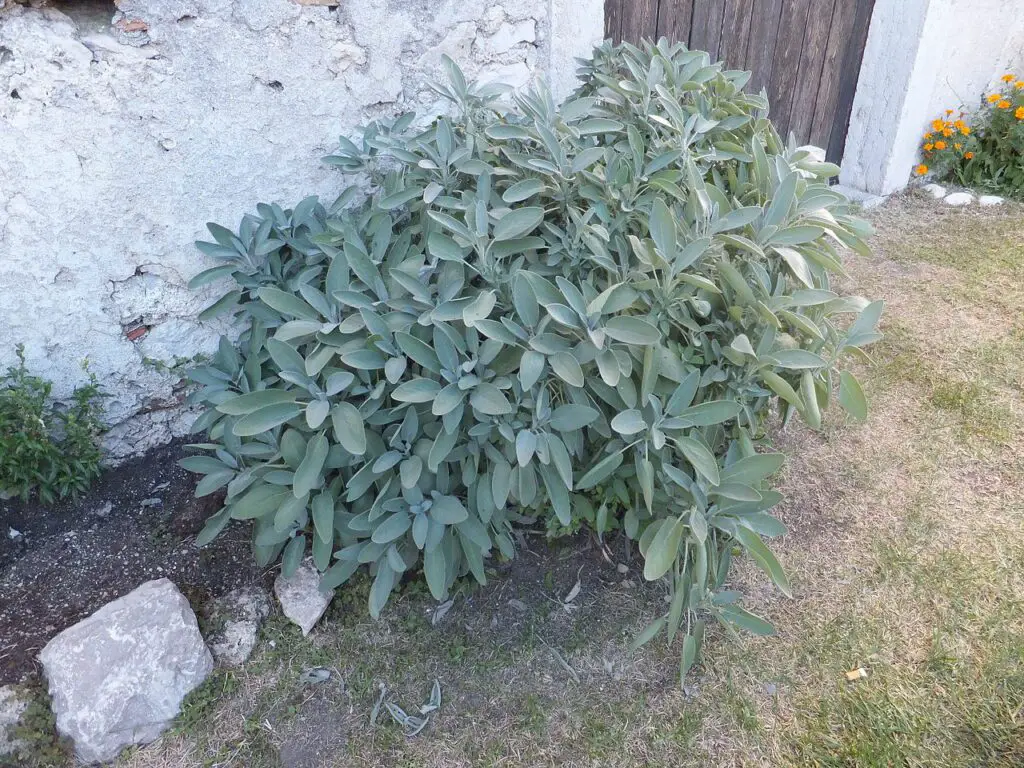Sage is a tasty and highly aromatic herb that can be enjoyed by both people and dogs alike.
That said, it’s important to remember that just because something is safe for us to eat, doesn’t mean it’s right for our furry friends.
So, can dogs eat sage? Read on to find out the details about what could make this herb an appropriate (or inappropriate) addition to your pup’s diet.
Can Dogs Eat Sage?

Yes, dogs can eat sage both fresh or dried. Sage is a herb that is safe for dogs to consume in moderation. According to the American Society for the Prevention of Cruelty to Animals (ASPCA), all parts of the sage plant – including the leaves, stems, and flowers – are non-toxic for dogs.
Sage is considered to be something of a superfood for dogs due to its high levels of vitamins and minerals, such as vitamin A, vitamin C, calcium, iron, magnesium, and potassium.
It also contains antioxidants that help protect your pup from free radicals that can cause cell damage.
When adding sage to your pup’s diet, it is important to use fresh or dried sage in moderation. Too much sage can lead to digestive upset in large doses so it’s best not to give your dog more than a teaspoon per day.
Additionally, when using dried sage make sure it has no added salt or other seasonings as these can be bad for your pup’s health.
The safest type of sage for dogs is the common garden sage (Salvia officinalis). This type of sage has been used medicinally by humans since ancient times and is known for its many health benefits.
Other types of sages may contain higher levels of certain compounds that could be toxic if ingested in large amounts so it’s best to stick with common garden sage when feeding your pup this herb.
Overall, adding small amounts of fresh or dried common garden sage (Salvia officinalis) into your pup’s diet can provide them with additional vitamins and minerals as well as antioxidants which help protect their cells from damage caused by free radicals.
Just remember not to give them too much as too much can lead to digestive upset in large doses.
Can Dogs Eat Sage
How Much Sage Can Dogs Eat?

The amount of sage you can feed your pup depends on their size and weight, but it’s best to start with no more than a teaspoon per day.
Be sure that the sage you are feeding is fresh or dried common garden sage (Salvia officinalis) and has no added salt or other seasonings as these can be bad for your pup’s health.
If you have any questions, it’s always best to consult with your vet before adding anything to your pup’s diet.
Can Dogs Eat Sage
Sage Feeding Chart According To Size
| Food | Size | Portion |
|---|---|---|
| Sage | Toy dogs | 1/2 tsp per day |
| Sage | Small dogs | 1/2 tsp per day |
| Sage | Medium dogs | 1 tsp per day |
| Sage | Large Dogs | 1 tsp per day |
Sage Feeding Chart According To Age
| Food | Age | Portion |
|---|---|---|
| Sage | 0 – 6 months | Don’t feed |
| Sage | 6 – 12 months | 1/2 tsp per day |
| Sage | 12 – 24 months | 1 tsp per day |
| Sage | 24+ months | 1 tsp per day |
How Often Can Dogs Eat Sage
Sage can be given to your pup in moderation, so no more than once a day. As with any dietary change, it is important to consult with your vet before feeding your pup sage on a regular basis.
Additionally, if you notice any adverse reactions after giving sage to your pup, stop feeding it and contact your pet’s vet right away.
Can Dogs Eat Sage
Health Benefits of Sage To Dogs
- Improves digestion. Sage can help to balance the digestive tract in dogs, making it easier for them to break down and absorb nutrients from their food. It may also reduce bloating, gas, and general stomach upset.
- Promotes respiratory health. Sage helps to soothe coughing and wheezing due to allergies or asthma. Its anti-inflammatory properties can also reduce swelling and congestion of the airways in dogs.
- Aids with skin problems. Sage is antibacterial and antifungal, making it useful for treating fungal infections such as ringworm or yeast infections. It can also be used to treat skin irritations such as itching, dryness, or infections caused by parasites like fleas and ticks.
- Boosts the immune system. Sage is an immune booster that contains antioxidants that can help protect your pup’s body from free radicals. Additionally, it contains vitamins A, C, and B complex and other essential minerals like calcium which aid in keeping your pup healthy overall.
Potential Risks of Feeding Sage To Dogs
- Diarrhea & Vomiting. Sage is safe to consume in moderate quantities, but large amounts may cause stomach upset and lead to vomiting and diarrhea. Additionally, some breeds are more sensitive than others and may be more prone to experiencing these symptoms.
- Drowsiness. The volatile oils in sage have a calming effect, so if your pup consumes too much sage it can result in drowsiness or even feelings of fatigue.
- Allergic reactions. Certain breeds of dogs may be prone to allergic reactions when consuming sage and could experience itching, rashes, or hives after consuming the herb. It’s important to monitor your pup for any signs of an allergic reaction before feeding them sage regularly.
Nutritional Benefits of Sage For Dogs
| Sage Nutrition Facts pet 100 grams | % DV * |
|---|---|
| Calories | 2 |
| Total Fat | 0.1 g |
| Cholesterol | Magnesium |
| Sugar | 0 g |
| Glycemic Index | 15 |
| Sodium | 0 mg |
| Carbs | 0.4 g |
| Protein | 0 g |
| Vitamin D | 0% |
| Calcium | 1% |
| Iron | 1.1% |
| Magsnesium | 0% |
Can Dogs Eat Sage
Are Dogs Sensitive To Sage?
Yes, dogs can be sensitive to sage, just like any other plant. The most common signs of sensitivities include vomiting, diarrhea, or skin reactions such as redness, itching, and hair loss.
If you notice any of these symptoms after feeding your pup sage, stop giving them the herb and consult with your vet right away.
Additionally, some breeds may also be more predisposed to having adverse reactions when consuming sage.
How To Prepare Sage For Dogs
- Dietary supplement. Sage can be added to your pup’s food as a dietary supplement. Start with small amounts and gradually increase the dosage depending on their size and age. Be sure to talk to your vet before giving your pup sage or any other dietary supplement.
- Infusions. Make an infusion of fresh or dried sage by boiling it in water and then straining it before giving it to your pup as tea. This method is especially helpful for soothing coughing and respiratory issues in dogs.
- Topically. Sage oil can be applied directly onto the skin for treating skin irritations such as dryness, itching, redness, or fungal infections like ringworm. It’s important to dilute the oil with a carrier oil first before using it topically to avoid potential skin reactions in sensitive breeds.
How Fast Will Dogs Digest Sage
On average, dogs are able to digest sage within 30 minutes to an hour. However, this can vary depending on several factors such as the size and breed of your pup, or the amount of sage they have consumed.
Additionally, if your pup is not used to consuming sage, it might take them a bit longer to digest it. Be sure to monitor your pup closely after consuming sage and look out for any signs that could indicate sensitivities or adverse reactions.
FAQs
Is burning sage okay for dogs?
Burning sage is generally considered to be safe for your pup, however, the smoke from burning sage can be irritating to their lungs and eyes.
Additionally, if your pup has a respiratory condition or other health issues, burning sage may exacerbate its symptoms.
To ensure your pup’s safety, it’s best to avoid burning sage or seek advice from your vet before doing so.
Is sage candle safe for dogs?
While it is generally safe for dogs to be in the same room with scented candles, it is not recommended to allow them to ingest wax or smoke from a candle made of sage.
If you decide to use a sage-scented candle, make sure your pup is not able to reach it and keep it out of their reach.
Furthermore, if you notice your pup displaying any signs of distress after being exposed to the candle’s fumes, remove them from the area immediately and contact your vet for further advice.
In Conclusion
Sage can be beneficial for dogs in small doses.
While it may help to fight bacteria, reduce inflammation, and improve digestion, too much of this herb could lead to digestive problems or an upset stomach.
Related articles:
- Can Dogs Eat Basil? Fresh or Dried, Find Out Now!
- Pet-Friendly Seasonings: Can Dogs Eat Parsley?
- Can Dogs Eat Cinnamon? Explore The Benefits and Risks
- Ginger Woof! Can Dogs Eat Ginger?
- Can Dogs Eat Turmeric? The Super Spice For Dogs!
- Can Dogs Eat Thyme? The Perfect Addition To Your Dog’s Meal
- Can Dogs Eat Oregano? The Oregano Debate
- Can Dogs Eat Rosemary? Explore The Benefits of This Pet-Friendly Herb
- Can Dogs Eat Mint? Freshen Up Your Pup’s Breath





Leave a Reply